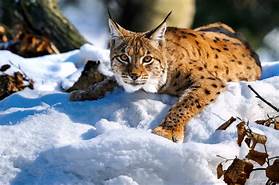Can a Lynx Be a Pet?
As beautiful and fascinating as lynxes are, the simple answer is no, they cannot be pets. Here are a few reasons why it is not a good idea to keep a lynx as a household pet:

Wild Animals vs. Domesticated Animals
1. Wild Animals Don't Domesticate: Unlike dogs and cats, which have been domesticated over thousands of years, lynxes are wild animals not suited for domestication. Domestication involves a gradual process of adapting wild animals to live in close association with humans, something that hasn't happened with lynxes.
2. Untamed Behavior: Lynxes have natural instincts that include hunting, marking territory, and seeking solitude. They cannot learn to follow human commands or adapt to household routines. Trying to suppress their wild behavior can lead to frustration and aggression.
Legal and Safety Concerns
1. Illegal in Many Places: In most regions, it is illegal to own a lynx as a pet, as they are protected species under wildlife conservation laws. Even in places where ownership is permitted, obtaining the necessary permits and licenses can be challenging.
2. Safety of the Lynx and Humans: Keeping a lynx as a pet poses a significant safety risk. With their sharp claws and teeth, lynxes can easily inflict serious injuries on humans, especially children. Even if raised in captivity, they are unpredictable and can become aggressive even with their owners.
Special Needs and Care
1. Space Requirements: Lynxes need ample space to run, climb, and exercise. Confining them to a house or apartment would not only be cruel but also harmful to their physical and mental well-being.
2. Specialized Diet: Lynxes are obligate carnivores, and their diet should primarily consist of fresh meat. This can be expensive and difficult to provide consistently.
3. Veterinary Care: Lynxes have unique healthcare needs, and finding a veterinarian experienced in treating wild animals can be challenging. This can lead to health problems going undiagnosed or untreated.
Conservation and Preservation
1. Respecting Wild Populations: Keeping lynxes as pets fuels the demand for exotic animals and contributes to their illegal trade. This can have devastating impacts on wild populations, as lynxes are already facing habitat loss and hunting pressure.
2. Supporting Conservation Efforts: By choosing not to keep lynxes as pets, you help support efforts to preserve their natural habitats and protect their wild populations.
In conclusion, lynxes are not suitable pets due to their wild nature, legal restrictions, safety concerns, special needs, and the importance of wildlife conservation. Keeping lynxes as pets is not only cruel but also poses serious risks to both the animals and humans.Declaration: All article resources on this website, unless otherwise specified or labeled, are collected from online resources. If the content on this website infringes on the legitimate rights and interests of the original author, you can contact this website to delete it.





